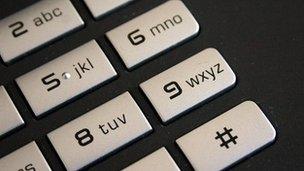Block on cold calls not working, says Which?
- Published
- comments

About 19 million people are signed up to the Telephone Preference Service
Millions of people are signed up to a system designed to stop unsolicited sales and marketing calls, but some are still receiving up to 10 calls a month, consumer group Which? says.
It said it had heard about people being called by many different companies.
Companies are legally required not to call domestic numbers registered with the Telephone Preference Service (TPS).
The organisation that runs the service said that it acted on every complaint.
Firms should also avoid selling or marketing goods and services to those on TPS list.
'Computer error'
Sheila Clark, who is 84 and has Alzheimer's disease, said she was being called up by firms on a daily basis, despite being registered with the TPS.
In June, nearly £100 was debited from her bank account after one call from a firm advertising a call-blocking device.
Mrs Clark's son, Paul King, who has power of attorney over her financial affairs, spotted the transaction.
"She has been signed up to the Telephone Preference Service for around two years, but still cold calls are being made to her regularly," he said.
"On this occasion, a company called telecombill.co.uk took £92.35 out of her account, but this device didn't arrive and despite repeated calls, we were unable to get the money back."
An agent at telecombill.co.uk, based in Coleraine in Northern Ireland, told the BBC that the money was taken out as a security deposit for the call blocking device. He also said that the company had called Mrs Clark by mistake because of a computer error. The firm has now refunded the money.
The consumers' association Which? has received other complaints about people being cold-called at home by many different companies, despite being signed up to the TPS.
Alex Neill, from Which?, said: "When we looked at the Telephone Preference Service, which is supposed to stop them, we found that when you register, you are still getting 10 calls a month, which is 10 too many."
Review
The TPS is run by the Direct Marketing Association and has about 19 million people on its register. The head of the service, John Mitchison, said that it was frustrating that calls were still being made to registered users, but he stressed that the service did not have any enforcement powers.
"We hold the database of telephone numbers and we take complaints if people still receive calls," he said.
"We act on every complaint by contacting the company concerned and reminding them of their legal obligations. We then pass all the information on to the Information Commissioner's Office, which can issue fines of up to £500,000 to those people who ignore the regulations."
The Information Commissioner's Office and Ofcom, the communications regulator, have launched an action plan to tackle the issue of nuisance calls.
They are assessing how well the TPS is working and aim to improve the way in which those behind nuisance calls are traced. They are due to publish a report early next year.
For now, the TPS advises anyone receiving a cold call at home to be vigilant with personal information and to report any companies suspected of breaking the rules.